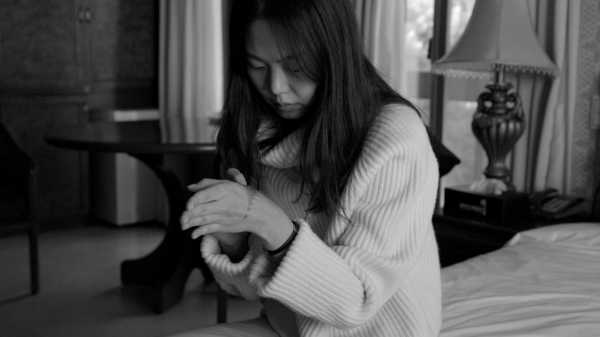
There was a children’s show, in the sixties, on which the host would invite children to draw several random lines on a big piece of paper and the host would then incorporate them into a drawing. The South Korean director Hong Sang-soo, who has lately been making two or three films a year (fourteen features in the past decade, twenty-three in all so far), does something of the sort with his own life. Working fast and on a low budget, he pulls together a few sprigs of experience and ideas and, inwardly observing the pattern that they make together, creates a sort of cinematic crystal structure that’s compact, hard-edged, sharp-pointed, and sometimes dazzlingly intricate.
His sense of form is comprehensive and musical; like a composer, he develops, with a seemingly spontaneous rapidity, an underlying principle—a different one for each movie—and he has developed a distinctive style of filming, dialogue, and performance to match. A film by Hong Sang-soo is as much a tone, a mood, and a method as it is a drama. It’s also, in an over-all way, a subject—usually the romantic nexus of artists (often directors, actors, and writers) and others in their lives, in and around the business of art. He’s got two new films in this year’s New York Film Festival (as he did in last year’s edition, too), and the most recent of them, “Hotel by the River” (screening October 6th and October 8th), breaks from the formula and the style a bit, but it’s notable less for its place in Hong’s career than it is for its immediate impact as an experience.
Each of his recent constructions builds the past into the present with a mathematical implacability and a piercing emotional power; in some cases, the past is a matter of political history, as well as romantic turmoil and artistic struggle. In “Hotel by the River,” Hong—who in the past has compressed his tales into tense and fixed frames that pan and zoom to parse the action with relentless intensity—loosens his style for a story that expands and deepens his themes. It’s a double drama centered on, exactly as the title suggests, a hotel—a small one, in a small town, in the isolation of off-season winter, where Ko Younghwan (Ki Joo-bong), a famous poet (imagine!), has been offered a room by its owner, who’s a fan. The middle-aged Ko, contemplating the desolation in solitude and at leisure and writing in his slovenly room, receives a visit from his two grown sons, whom he has summoned to the hotel for a reunion: the younger, Byungsoo (Yu Jun-sang), a newly successful movie director, and Kyungsoo (Kwon Hae-hyo), who has just gone through a divorce.
Even before the three men meet and lay bare longstanding family grievances, frustrations, and humiliations, they endure a screwball series of misunderstandings and missed connections that, for all their symbolic import, set family life in the context of awkward and absurd comedy. But while missing one set of connections, Ko makes another, launching another round of intersecting passions. A young woman is staying at the hotel, too—Sanghee (Kim Min-hee), who has endured a bad breakup with a callous man, is nursing an unexplained burn on her hand, and is visited by a friend named Yeonju (Song Seon-mi) who arrives to console and commiserate.
There’s a series of crisscrossing comedic twists involving coffee, others involving autographs, still others involving a car. There are jokes involving names and Ko’s presents for his grown children. But once the action—which is to say, the conversation—begins, it’s quietly flaying. Stories of childhood unhappiness and misunderstandings, of broken bonds and enduring fears, of painful reminiscences and stifled reproaches surge to the fore, while other silences and fears congeal and harden. Meanwhile, there are the two women, cocooned in a hotel as if taking refuge from the broken and wounding men in their lives and finding themselves in unanticipated proximity to others of the same ilk.
Hong builds the action into a framework of poetic premonitions that exude anticipatory danger. Ko is something of a dinosaur, awkwardly insensitive and out of tune, peremptory and domineering; nonetheless, Hong catches his moods and lyrical observations, weaving his writings and his internal monologues into the action while displaying flashbacks and point-of-view shots that suggest a cinematic counterpart to the poet’s etched and assertive phrases. For that matter, Hong goes a step further here: he creates a constellation of objects and moments—architectural, automotive, culinary, medical, whimsical—and gives them a new artistic state of being, a reverberant poetic identity. They both inform the over-all composition and leap out from it.
Sourse: newyorker.com






